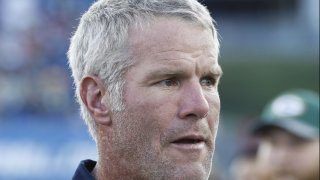
Newly revealed text messages show how deeply a Mississippi governor was involved in the state paying more than $1 million in welfare money to Brett Favre to help fund one of the retired NFL quarterback's pet projects.
Instead of the money going to help low-income families in one of the nation's poorest states, as intended, it was funneled through a nonprofit group and spent on a new $5 million volleyball facility at a university that the football star and the governor both attended.
We've got the news you need to know to start your day. Sign up for the First & 4Most morning newsletter — delivered to your inbox daily. Sign up here.
One of the texts from 2017 showed Republican Gov. Phil Bryant, who left office in 2020, was “on board” with the arrangement. The state is suing Favre and others, alleging they misspent millions of dollars in welfare money. The director of the nonprofit has pleaded guilty to criminal charges in Mississippi’s largest public corruption case in decades.
The texts were in documents filed Monday in state court by an attorney for the nonprofit, known as the Mississippi Community Education Center. Messages between Favre and the center's executive director, Nancy New, included references to Bryant. The documents also included messages between Bryant and Favre and Bryant and New.
New pleaded guilty in April to charges of misspending welfare money, as did her son Zachary New, who helped run the nonprofit. They await sentencing and have agreed to testify against others. Favre has not been charged with any criminal wrongdoing.
U.S. & World
The day's top national and international news.
“Just left Brett Farve,” Bryant texted New on July 16, 2019, misspelling the athlete's last name. “Can we help him with his project. We should meet soon to see how I can make sure we keep your projects on course.”
New responded: “I would appreciate having the opportunity to follow through with all the good things we are working on, especially projects like Brett's.”
Later that day, New texted Favre to let him know she was meeting with the governor.
“I love John so much. And you too,” Favre responded to New, referring to the Mississippi Department of Human Services director at the time, John Davis.
The texts also showed discussion between Favre and New about arranging payment from the Human Services Department through the nonprofit to Favre for speaking engagements, with Favre then saying he would direct the money to the volleyball facility at the University of Southern Mississippi.
Favre played football at the university, located in Hattiesburg, before going to the NFL in 1991. His daughter began playing on the school's volleyball team in 2017.
According to court documents, Favre texted New on Aug. 3, 2017: “If you were to pay me is there anyway the media can find out where it came from and how much?”
New responded: “No, we never have had that information publicized. I understand you being uneasy about that though. Let’s see what happens on Monday with the conversation with some of the folks at Southern. Maybe it will click with them. Hopefully.”
Favre replied: “Ok thanks.”
The next day, New texted Favre: “Wow, just got off the phone with Phil Bryant! He is on board with us! We will get this done!”
Favre responded: “Awesome I needed to hear that for sure.”
According to a previous court filing, New's nonprofit made two payments of welfare money to Favre Enterprises, the athlete's business: $500,000 in December 2017 and $600,000 in June 2018.
On Dec. 27, 2017, Favre texted New: “Nancy Santa came today and dropped some money off (two smiling emojis) thank you my goodness thank you.”
“Yes he did," New responded. “He felt you had been pretty good this year!”
Attorneys for Favre did not immediately respond to a phone message Wednesday from The Associated Press. NBC News was first to report that the FBI has questioned Favre in the matter, but there is no indication Favre is a target of the FBI’s criminal investigation.
In a July 11 court filing, New’s attorney wrote that Bryant directed her to pay $1.1 million in welfare money to Favre through the education center for “speaking at events, keynote speaking, radio and promotional events, and business partner development.”
In July, a Bryant spokesperson said allegations that the governor improperly spent the money are false and that Bryant had asked the state auditor to investigate possible welfare fraud.
Billy Quinn, an attorney representing Bryant, told the AP on Wednesday that Bryant did not direct New to make the $1.1 million payment to Favre. Quinn said a careful examination of court records will show “there's no proof that occurred. And that's because it didn't.”
Bryant served two terms as governor and could not run again in 2019 because of term limits. He earned his bachelor’s degree from the University of Southern Mississippi.
In May, the Mississippi Department of Human Services filed a civil lawsuit against Favre, three former pro wrestlers and several other people and businesses to try to recover millions of misspent welfare dollars. The lawsuit said the defendants “squandered” more than $20 million from the Temporary Assistance for Needy Families anti-poverty program.
About 1,800 Mississippi households received payments from the program in 2021, according to the Department of Human Services. A family of three must have a monthly income below $680 to qualify, and the current monthly benefit for that family is $260. Payments are allowed for up to five years.
In pleading guilty, Nancy and Zachary New acknowledged taking part in spending $4 million of welfare money for the volleyball facility.
The mother and son also acknowledged directing welfare money to Prevacus Inc., a Florida-based company that was trying to develop a concussion drug. Favre has said in interviews that he supported Prevacus.
Mississippi Auditor Shad White said Favre was paid for speeches but did not show up. Favre has repaid the money, but White said in October that he still owed $228,000 in interest.
In a Facebook post when he repaid the first $500,000, Favre said he didn’t know the money came from welfare funds. He also said his charity had provided millions of dollars to poor children in Mississippi and Wisconsin.



